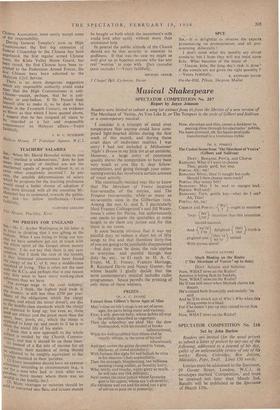Musical Shakespeare
SPECTATOR COMPETITION No. 207 Report by Joyce Johnson
Readers were invited to submit a song (or extract from it) from the libretto of a new version of The Merchant of Venice, As You Like It, or The Tempest in the style of Gilbert and Sullivan or a contemporary musical.
I consider it a triumph of mind over temperature that anyone could have com- posed light-hearted ditties during the first week of this month, and during those cruel days of midwinter realities I was sorry I had not included a Midsummer Night's Dream in my little list as an antidote. However, a large entry of consistent quality shows the competition to have been very much as you like it,. dear fellow- competitors, and going through your enter- taining entries has involved -a certain amount of vocal activity.
The statistically-minded may like to know that The Merchant of Venice inspired four-sevenths of the entries, and The Tempest two-sevenths, while as many as six-sevenths were in the Gilbertian vein. Among the non G. and S. I particularly liked Frances Collingwood's and Jill Water- house's solos for Portia, but unfortunately one needs to quote the quotables at some length to do them any justice and for this there is no room.
It soon became obvious that it was my painful duty to reduce a short list of fifty songs to five and that therefore forty-five of you are going to be justifiably disappointed —but duty must be done, the rule applies to everyone and painful though that duty be, etc., so £1 each to H. A. C. Evans, M. E. Fossey, Francys Heritage, R. Kennard Davis and Nancy Gunter, for whose benefit I gladly decide that the term contemporary musical includes radio programmes. Space permits the printing of only three of these winners.
PRIZES
(H. A. C. EVANS) Extract from Gilbert's Seven Ages of Man Man's time on life's stage is an act of seven ages, his parts being many and various; First, a sick, peevish baby, whose habits all may be politely described as vagarious; Then the schoolboy see plod like the slow hodmandod, with his satchel of books informational, While his well-scrubbed face shines and he vocally whines, to the scene of his toil educational; And next comes the genus devoted to Venus, the lover, of mood atrabiliary; With furnace-like sighs his sad ballads he cries to his mistress's hair superciliary; Then the strangely blaspheming, too bellicose seeming young soldier, so beastlily hairy, Who, tetchy and touchy, wants glory so much, . he will take any risk militairy; Now, shrunken and thin, comes a dodderer in, peering dose through his spectacles' pebble, No more orotund, oh, his basso-profundo transformed to a tremulous treble.
(M. E. FOSSEY) The Casket Scene from 'The Merchant of Veni (Gilbert and Sullivan)
DUET : Bassanio, Portia, and Chorus
BASSANIO: What if I were to choose Thee, gaudy gold, but lose.
PORTIA: Ah—me!
BASSANIO: Silver, thou'rt naught but cash: Should I then choose mere trash?
PORTIA: Hey nonny NO! BASSANIO: May 1 be wed to meagre lead.
PORTIA: Well said!
BASSANIO: Turn, gentle key—what do I see?
Ah, Thee!
PORTIA: Ah, me!
CHonus and Poimn:Wought to mention 1e ') f 'twas her} intention that this invention
should succeed,
{we're delighted { their.),
our
And troth is 1 m
plighted and f they'rel united we're With joyous speed!
(NANCY GUNTER) Much Binding on the Rialto (` The Merchant of Venice' up to date) DUET: Solanio and Salarino Now, WHAT news on the Rialto? Antonio is losing flesh by buckets, Now, WHAT news on the Rialto? He'll lose still more when Shylock claims his ducats.
He's ruined both financially and socially 'tis said


































 Previous page
Previous page